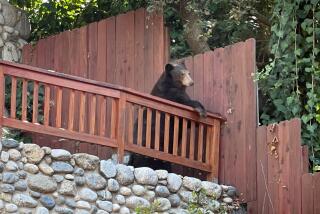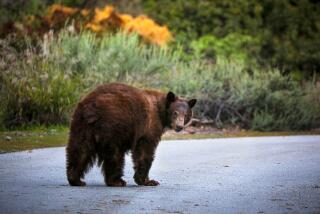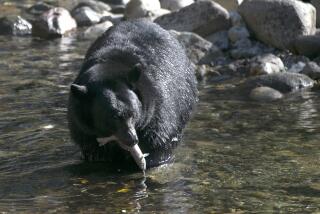Bear cubs get more motherly love when their moms are protected from hunters
- Share via
Twenty-five years ago, brown bear mothers in Sweden rarely spent more than 18 months raising their cubs. Today, it’s not unusual for moms to devote 2 1/2 years to their cubs before they go off on their own.
What’s behind this new passion for parenting? Researchers attribute it to a hunting regulation that protects mother bears and their cubs.
Detailed data on brown bears living in Swedish forests show that when moms feel under the gun, their best survival strategy is to have as many cubs as possible — which means weaning their young quickly.
However, when they don’t feel pressured by hunters, they respond by investing more time and resources in their offspring. That gives the cubs a better chance of survival when they finally do make their own way in the world.
The results surprised researchers, who predicted that the mother bears would try to have as many cubs as they could.
“We expected that shorter periods of maternal care would be more advantageous, because it provides females with more reproductive opportunities and because the energetic costs associated with maternal care are high in mammals,” the researchers wrote in a study published Tuesday in the journal Nature Communications.
Scientists have been observing this population of Scandinavian brown bears (Ursus arctos) since at least 1987, keeping track of as many individual animals as they could. The bears in this forest of Scots pine and Norway spruce trees are “heavily hunted” between late August and mid-October (though the hunting season can end earlier if the quota has been met).
The regulation at the heart of the study prevents hunters from killing adult female bears that are seen with their dependent cubs. That means that the more time moms and cubs spend together, the longer they are protected from hunters.
Still, it took several years for observers to find a family unit that stuck together for 2.5 years. The cubs were born in 1993, and the litter was weaned in 1995. Since that time, 25% of brown bear litters were raised with the “2.5-year tactic,” according to the study.
This survival strategy became more common over time. In the first decade after the pioneering family was found, litters with longer childhoods were seen only every other year. But since 2005, at least one such litter was found every year. In 2009 and 2010, more than two-thirds of observed litters were raised this way, though that level of popularity didn’t last.
Although the costs of that extra year of parenting were high for moms (both in effort and in lost chances to have more cubs), the benefits were substantial as well. Adult female bears were nearly four times more likely to be killed by a hunter if they were on their own than if they were raising cubs. Mama bears that used the 2.5-year tactic spent fewer hunting seasons on their own — and their overall survival rate was twice as high.
Their cubs benefited too. Focusing on female cubs, the researchers found that all of the cubs that got extended parenting survived their second year of life. However, among cubs that were cut loose after 1.5 years, 22% didn’t make it to their third birthday.
Hunters weren’t the only ones who preyed on bears with shorter childhoods. These animals also were more likely to be killed by other bears in battles over territory and other resources, according to the study.
The results show that humans can shape wildlife species not only by killing animals but by deciding not to kill them, the researchers wrote.
“Prolonged maternal care provides a buffer against high hunting pressure,” they wrote. “If levels of hunting pressure continue to be high or increase, our study suggests that the relative occurrence of the 2.5-year tactic will increase.”
Follow me on Twitter @LATkarenkaplan and “like” Los Angeles Times Science & Health on Facebook.
MORE IN SCIENCE
By going vegan, America could feed an additional 390 million people, study suggests
Yes, a Chinese space station is about to plummet to Earth. Here’s why you don’t need to freak out
It looks like a fish, but it’s not. Meet the robot built to spy on ocean life







